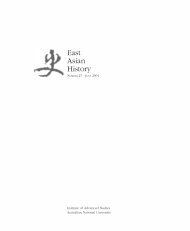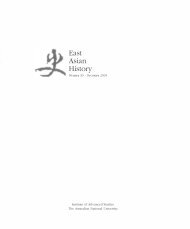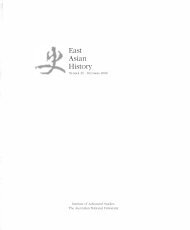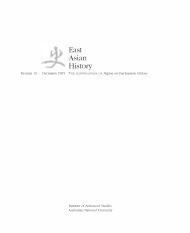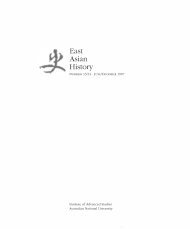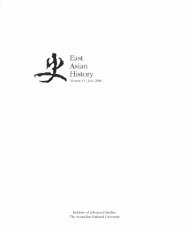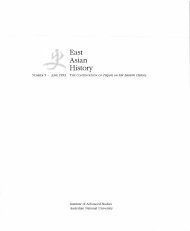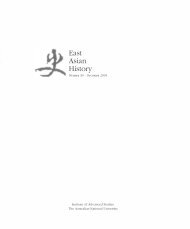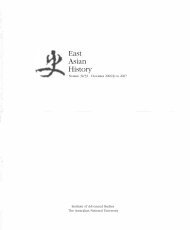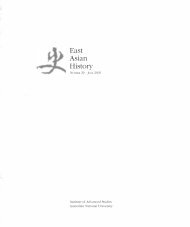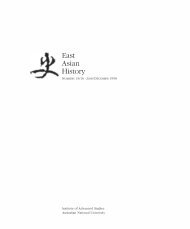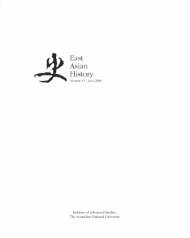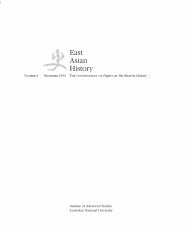East Asian History - ANU
East Asian History - ANU
East Asian History - ANU
- No tags were found...
Create successful ePaper yourself
Turn your PDF publications into a flip-book with our unique Google optimized e-Paper software.
BIRDS AND THE HAND OF POWER61political verbs in modern Chinese discourse: Jiefang fIifftx, to liberate. Ratherthan serving as a permanent representative of the Uyghurs at Mingzong'scourt, a living bridge between two polities of Turkic background, the falconis the object of a strategy of sovereignty which stresses the emperor'sdisengagement from the world of hunting and from the claims made by thepeoples to the west of Latter Tang territory. The release of the falcon conformswith earlier public renunciations of hunting by Mingzong and officialdecrees against the submission of gifts of falcons and hawks that simultaneouslyinvoked a rhetoric of care for the moral foundations of the state224 and soughtto erect and maintain boundaries between the Latter Tang and those on itswestern and northern frontiers. Four years earlier, the Tanguts of the Ordoshad also defied the ban on the submission of hunting birds and had sent awhite goshawk (a tuyghun) to Mingzong. His senior minister, An Zhonghui.m, known for his rivalries with those who displayed affinities with theInner <strong>Asian</strong> cultural and political realm,225 informed the sovereign that thebird had been sent back. Mingzong formally assented to this, but is reportedto have surreptitiously ordered his retainers to fetch the bird and to have goneout to sport with it, instructing his officials not to let An find out. 226As the object of this furtive pleasure, the white goshawk is at the centreof a charged political field, infused with the energies of competing projectsand agendas. The bird is not something to which Mingzong is indifferent. Hispublic rejection of the goshawk and falcon is part of the broader attempt toregulate parties of Uyghur, Tangut and Tuyuhun who brought their sheepand horses into Latter Tang territory with complete indifference to governmentattempts to dictate the terms of their entry.227 The struggle over these whitebirds involves competition between the Latter Tang, Uyghurs and Tanguts toorganise the field of political exchange. This is not reducible to a clashbetween "Chinese" and "Central <strong>Asian</strong>" politics, in which Mingzong can beportrayed as caught between public adherence to the world of grain andbureaucrats and the private temptations of an ancestral Turkic huntingculture. Rather, Mingzong's public refusal of these gifts of distinguished birds,gifts which had the potential to augment his own political distinction, assertsauthority over the political field as a whole by decreeing what will and willnot be the domain of engagement. Such an act conforms with a situation inwhich sovereignties are far from unequivocal, something registered in theintensity of violent and non-violent exchanges between the various centresof power in North China, the Ordos and the Gansu corridor at this time. Itis far from coincidental that the Uyghur falcon arrived in Mingzong's capitalin the same year as a delegation from Liangzhou made up of the descendantsof the troops sent by Yizong from central China to block the eastwardadvance of Zhang Yichao in the 860s, 228 or that it was given in the wake of224 Mingzong is reported as explaining thebanning of tribute in hunting birds as theresult of watching hunters trample cropsIstanding in the field in pursuit of theirquarrywhen he was young. See Zizhi tongjian,juan 277, pp.9061-2.225 An was said to dislike Kang Fu m, theprefect of Cizhou CliZHI'1. modern Cixianl!!.g. in Hebei province), for speaking in anInner <strong>Asian</strong> language to Mingzong in privateaudiences. See Zizhi tongjian, juan 276,p.9033. James Hamilton discusses Kang Fuin footnote 2 on p.105 of Les Ouighours a!'epoque des Cinq Dynasties. The languageis referred to as huyu M -rg which meansgenerically Inner <strong>Asian</strong> or 'Barbarian' speech;it is probably Turkic but could possibly beSogdian, Sogdians having strong links withTurkic peoples at this time. Many people ofSogdian background had the surname Kang.An was also a common name amongst thosewith a Sogdian inheritance. On the linkagebetween Kang and An and Sogdiana, seeTongdian, juan 193, p.1039.226 See the biography of An Zhonghui inXin Wudai shi, juan 24, p.252. In anotherversion of the same incident, An Zhonghuiinforms the emperor that "Xiazhou 1'1'[the key Tangut centre in the Ordos] hasviolated an imperial order and sent in tribute;your servant has put a stop to it," to whichMingzong replies, "Good." Then, when thecourt audience has ended, the emperorsecretly orelers those around him to bringthe bird back. See Jiu Wudai shi, juan 40,p.555. A French translation of the story isgiven by James Hamilton (who gives thedate of 24 November 929 for this event) inLes Ouighours a I 'epoque des Cinq Dynasties,p.lOS. Hamilton translates the words whichI have given as "put a stop to it" as "brokenoff the treaty": both readings are plausible.He also translates the bird as "eagle."Wittfogel anel Feng translate ying as 'eagle'in their The history of Chinese society: Liao,e.g. p.236.227 See Wudai huiyao, juan 29, pp.462-3.French translation by James Hamilton, LesOuighours a L'epoque des Cinq Dynasties,p.107. See also Xin Wudai shi, juan 74,p.912, Jiu Wudai shi, juan 40, p.549. Seealso Ruth Dunnel, "The Hsi Hsia," in HerbertFranke anel Denis Twitchett, eels, TheCamhridge history of China, vo1.6, p.165,anel the French translation of the passage inthe Xin Wudai shi by James Hamilton in LesOuighours a !'epoque des Cinq Dynasties,p.105.228 See Xin Wudai shi, juan 74, p.914.



